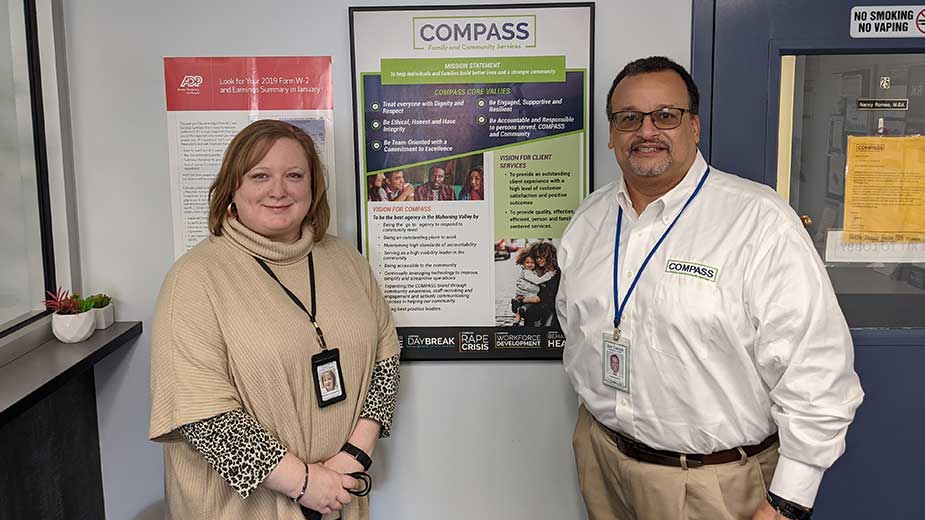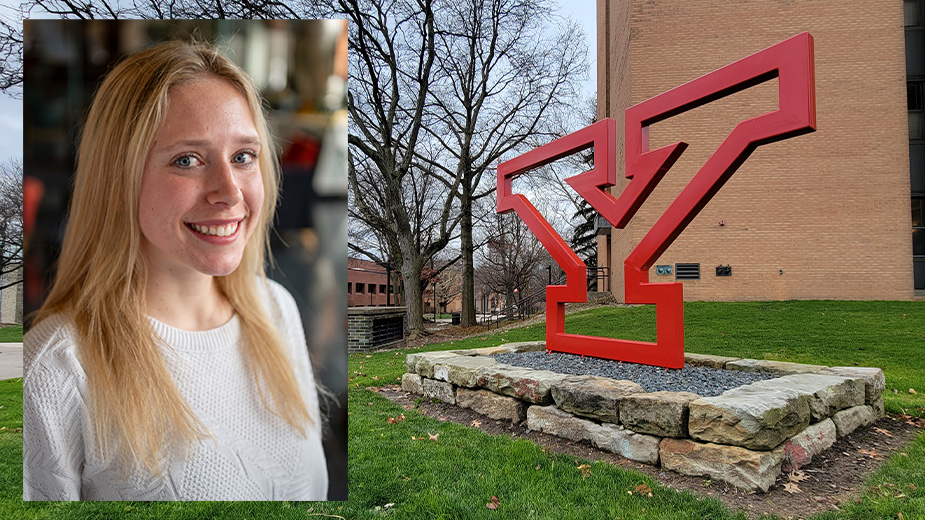Compass Places Job Seekers on the Path to a Career
YOUNGSTOWN, Ohio — As she steps off the Western Reserve Transit Authority bus to start her workday at Joann Fabrics and Crafts in Niles, Valerie Fisher says it’s “the best job I’ve had.”
Fisher has worked at Joann since October. And had it not been for Compass Family and Community Services, she might not have had the opportunity, she says. Fisher has an anxiety disorder, saying the first time she rode the WRTA, someone from Compass helped her navigate the route from Girard to Niles.
“I know I can call anytime if I have any anxiety about work,” Fisher says. “They can help talk me through that, which is really nice.”
From the time a client comes to Compass to the time they receive work, there’s no “cookie cutter” way to work with them, says Joseph Caruso, Compass CEO and president.
Typically, clients need 90 days from the time they start a job development program to when they can begin work, notes Theresa Berkenyi, Compass’ workforce development director. Then, it’s normally another 90 days to make sure the client and employer are copacetic.
Fisher’s path began with Compass’ Workplace Development program, assisting those seeking employment, providing ongoing support for employees and employers.
The assessment starts with Opportunities for Ohioans with Disabilities, a state vocational rehabilitation agency, Berkenyi says. Individuals go to OOD for help with employment, which leads to the state organization paying for the services Compass provides clients, she says.
Clients of Compass do not pay for their services. It is funded by places like OOD and other entities like the Mahoning County Mental Health Recovery Board as well as the Trumbull County Mental Health and Recovery Board, Berkenyi says. Compass also receives referrals from the Mahoning and Columbiana Training Association.
Compass was founded in 1979. Currently, about 75% of the organization’s clientele are disabled, Caruso says. Another 25% are unemployed and in some instances underemployed.
From July 1, 2019, to June 30, 2020, Compass provided services such as work-incentive planning sessions, career exploration sessions, community-based assessments and job development to 244 people in Mahoning and Trumbull Counties, Berkenyi says. That includes those filing for pandemic unemployment insurance at the start of the COVID-19 pandemic.
Compass placed 58 people in jobs, and 36 of individuals’ cases were closed after 90 or more days of coaching and retention. During that time, for both full- and part-time employment, the average wage was $9.62 an hour, she says.
During this current fiscal year, Berkenyi says Compass has helped 49 people obtain employment and 22 of those clients have solidified their status after 90 or more days of coaching and retention. Some of those who are working are still within their 90-day coaching period, so the 22 may increase. So far, the average wage is $10.24 an hour.
Berkeyni added those on Supplemental Security Income or Social Security Disability Insurance are “supplementing what they’re getting by gaining a wage. They are making more money than they would living on an SSI wage.
“They feel productive,” she says. “They feel like they’re giving back and have something meaningful to look forward to everyday.”
Berkenyi says Compass works with the clients to build a rapport and figure out their vocational goals, sometimes working with behavioral health therapists. To obtain higher education, Compass helps clients fill out Free Application for Federal Student Aid forms, she says.
Opportunities for Ohioans with Disabilities provides a list of required services each client should be provided, such as resume development, interviewing skills. Sometimes it’s as basic as filling out an application, because Berkenyi says some clients do not have the wherewithal for technology — getting a resume uploaded on sites like Indeed. She says all clients have to be registered with Ohio Means Jobs.
Caruso identifies and helps clients see the transferable skills they already have, but says they have trouble realizing how they grow those skill sets. Compass and its staff show clients how to grow those skill sets for a future employer. Places like Eastern Gateway Community College provide that training with certifications, preparing those employees for other jobs they might not have thought possible without proper knowledge.
Finding a temporary fix is not what Caruso wants for his clients, more like “a pathway of a career that they can move up a ladder.” Compass also works with the Mahoning and Columbiana Training Association to help people who might have been laid off, he says.
“It’s fun to see the light bulb kind of go on when people learn that, ‘Hey, you know what? I can do something else.’” Berkenyi added.
For Fisher, who had spent most of her career in childcare and even babysitting, she needed to be acclimated to retail. In October 2018, Compass paired her with a temporary job at Walgreens to warm her up to the new industry.
However, Fisher spent the next two years having a severe medical condition, unable to work. She says Compass kept contacting her to check on her wellbeing, eventually helping her land her current job where she stocks, helps customers and works the cash register.
“They helped me every step of the way,” she says.
Berkenyi says not only job skills, but soft skills like attendance and punctuality are assessed. Is there something that would trigger the client at this time? There are job coaches to help clients set goals. There are also other factors, such as if the client can work different shifts, has their own transportation and their childcare needs.
Berkenyi added there was another client who did not want to put her child in daycare, but wanted a janitorial position. Compass eventually put this client in a daycare center where she could be with her child, a solution that helped both parties.
“Sometimes all the planets line up for us,” Berkenyi says.
Despite Fisher’s medical setbacks, Compass was able to assist her to help her obtain her current job. Berkenyi says some cases are put on hold, but Fisher kept making progress.
“That’s what we want to see,” Berkenyi says.
Copyright 2024 The Business Journal, Youngstown, Ohio.



